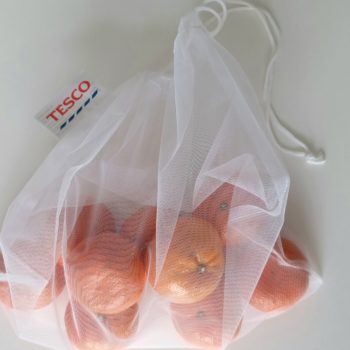Tesco Ireland launches reusable bag for fruit and veg

Shoppers can avail of sustainable bags in all 164 stores
1 March 2023
Tesco Ireland recently launched a new re-usable netted bag for loose fruit and vegetables. The new bag, which can be used over and over, will replace the traditional pinch and pull plastic bag and will offers customers a more sustainable option for bagging loose produce.
The bag is made from 100% recycled plastic bottles, is washable and can be recycled at clothing and textile banks. They are priced at 49 cent and are now available across the retailers 164 stores nationwide.
“We are always looking at new and innovative ways that reduce the use of plastic in our business,” said Joe Manning, commercial director, Tesco Ireland. “This re-usable net bag is one way we can do that. This is one little help for our customers to use less soft plastic in their shopping trip.”
Tesco Ireland has already made strides in making its packaging as sustainable as possible. In 2019, the company made a series of sustainability commitments, including a pledge that all packaging on Tesco own-label products will be fully recyclable by 2025.
Among its achievements to date the company has successfully removed all plastic-wrapped multipacks, replacing them with plastic-free multibuys, removing 1.5 million pieces of plastic wrap each year from items such as tinned tomatoes, tuna, and sweetcorn.
The company is also the first retailer in Ireland to create a recycling solution for soft plastics. In-store collection points can be found in all stores and customers can simply remove unwanted soft plastic packaging – such as cling wrap or outer wrap from water bottle multi-packs – at the end of their shopping trip.
Overall, Tesco Ireland has a net zero target of 2035 for its own operations and a commitment to cut emissions including those generated by the products it sells and across its supply chains to zero by 2050.



 Print
Print






Fans 0
Followers